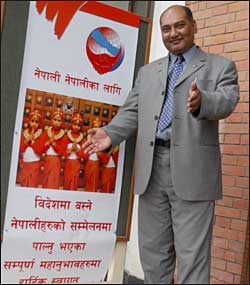 At a time when the country's economy is reeling under the effect of the insurgency and political instability, overseas Nepalis are getting together in Kathmandu for the first time to see how they can help.
At a time when the country's economy is reeling under the effect of the insurgency and political instability, overseas Nepalis are getting together in Kathmandu for the first time to see how they can help. Known variously as people of Nepali origin (PON), non-resident Nepalis (NRNs), or simply as 'global Nepalis', some 200 delegates from all over the world hope the three-day conference will inject a positive outlook on an otherwise gloomy situation in their motherland. They represent some 1.2 million Nepalis settled in 32 countries.
The government is fully on board, and so is the business community represented by FNCCI. King Gyanendra will attend the inauguration on Saturday at the BICC.
The government is confident that, like foreign Indians, overseas Nepalis can be an engine for investment growth. "We need their investment and we will work on ways to make it possible," says Finance Minister Prakash Chandra Lohani.
But that may be easier said than done. Foreign investors, even if they are of Nepali origin, will first want to see certain guarantees and incentives like dual citizenship and hassle-free repatriation of profits.
"We will see what the government offers us," says the NRN International Coordination Committee's Bhim Udas. "We can be as important as other sources of foreign direct investment." Nepalis abroad sent home nearly $1 billion last year, and remittances have been propping the country's faltering economy. A bulk of this money is repatriated by the estimated 400,000 Nepali labourers in the Gulf, Malaysia, Korea and Japan, but they are not represented at this weekend's conference. The gathering also does not have a single delegate from India where there are at least 1.5 million Nepalis working at any given time, and more than 5 million Indians of Nepali origin.
There is another problem: the exact definition of an NRN. The conference organisers say an NRN is "a Nepali citizen or a person of Nepali origin who has been staying outside Nepal for at least 183 days in a year for employment, business or self employment and indicating an intention for an uncertain duration of stay abroad. Non-resident foreign citizens of Nepali origin also covered under this definition".
The Nepali law prohibits Nepali nationals from investing in business enterprises abroad. Exceptions are made, but it requires cumbersome Rastra Bank procedures. There are many potential investors who still hold Nepali citizenship, and therefore, are not officially recognised as investors by the countries they live in. Government officials say they will have difficulty placing such persons under an FDI category.
Nepali law also does not recognise dual passports, and overseas Nepalis are themsleves divided on the issue. Those from America and Europe don't believe it is important to insist on dual passports, while others want the provision. Even if the government agrees, the move will need reciprocation by other countries involved.


